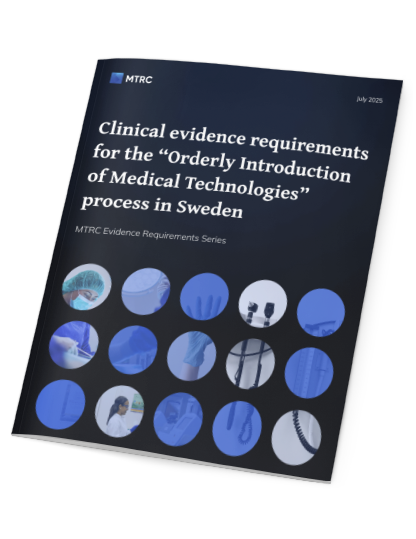
Key topics
There are three key themes describing market access for medical technologies in Sweden:
- Reimbursement: payment mechanism via the DRG-adjusted budget system
- Funding: recommendations in the national “Orderly Introduction of Medical Technologies” framework
- Health technology assessment: obtaining recommendations from the national and regional HTA bodies

Reimbursement
Hospital care is predominantly funded via a global budget adjusted for activity based on DRGs.
Sweden shares the DRG system (NordDRG) with several other countries, including Finland and Norway. However, all inter-regional care is reimbursed on a case-by-case basis via the DRG system. Therefore, the role of DRG is higher for procedures, which are concentrated only in several hospitals across the country and which provide care for patients from other Swedish regions.
DRGs are determined by the combination of a procedure code (KVÅ) and a diagnosis code (ICD-10). KVÅ nomenclature is maintained by the National Board of Health and Welfare and released annually. The Swedish version of the NordDRG system is approved annually, and the base rate is determined at the national level.

Funding
Sweden has no nationally defined list of health benefits which are guaranteed to the Swedish population. Decisions on which treatment methods to use and which new technologies to introduce are made by the hospitals.
Swedish regions have a system to collaborate on the introduction of medical technologies and to enable equal access, cost-effective and efficient use of medical technologies in the country (“Orderly Introduction of Medical Technologies” framework). In this framework, technologies are evaluated on the national level, and recommendations for the adoption of novel technologies are provided to payers (Regions) and healthcare providers.
Two organizations play a key role in the framework:
- MTP Council initiates the HTAs and makes final recommendations for adoption
- The Dental and Pharmaceutical Benefits Agency (TLV) performs horizon scanning activities to identify relevant topics for evaluation and full health technology assessments (with a heavy focus on the health economic evaluation) of the procedures selected for evaluation by the MTP Council.

Health technology assessment
HTA is performed on the national level (as part of the “Orderly Introduction of Medical Technologies” or as stand-alone evaluations) or on the regional level (which can inform regional/local decision-making).

Specifics for IVD tests
There is no specific reimbursement framework for in-vitro diagnostic tests. IVD tests are funded using a global budget principle as part of the laboratory funding.
Get insights from MTRC free analytical reports
Gain in-depth insights into evidence requirements for medical technologies in Sweden with free MTRC analytical reports and white papers
How can MTRC help?
Development of reimbursement analysis (procedure coding, payment mechanism, reimbursement tariffs, policy and HTA considerations)
Development of market access strategy
Development of an application for a procedure code
Development of an application for a DRG change
Adaptation of the global health economic model to the Swedish settings
Access to an educational seminar on the Swedish reimbursement system
MTRC has experience with more than 184 projects in Sweden
Get in touch
Contact us to discuss your needs and learn about our services




